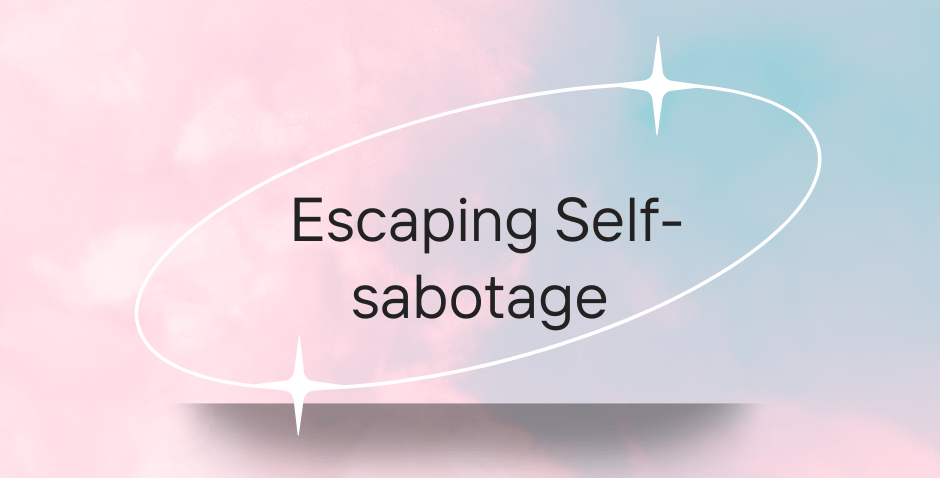Self-sabotage
This blog explores what self-sabotage is and how to overcome it.
#self-sabotage
4/29/20253 min read


Escaping Self-Sabotage: How to Stop Holding Yourself Back
Do you ever feel like you're the one standing in your way?
Many of us fall into self-sabotage patterns, sometimes without even realising it. Whether we procrastinate on goals, doubt our abilities, or set impossibly high standards, self-sabotage quietly blocks our path to growth, success, and happiness.
This guide explores the root causes of self-sabotage and offers practical strategies to break free. If you’re ready to stop fighting against yourself and start moving forward, read on.
What Is Self-Sabotage?
At its core, self-sabotage is an unconscious response to fear; fear of failure, fear of success, fear of not being good enough. We develop habits like procrastination, negative self-talk, or perfectionism not because we are lazy or unmotivated, but because we are trying to avoid pain, rejection, or disappointment.
Ironically, these behaviours do the opposite of protecting us. They reinforce the belief that we can’t succeed, creating a cycle that is hard to escape, until we understand what is really going on.
How Self-Sabotage Shows Up
Procrastination: Avoiding action out of fear or self-doubt.
Negative Self-Talk: A harsh internal critic constantly whispering, 'you are not good enough.'
Perfectionism: Setting unrealistic standards that lead to burnout or inaction.
Fear of Success: Worrying about the pressure or change that might come with success.
Isolation: Believing we have to go it alone or that we are unworthy of support.
The Inner Critic: The Voice Behind Self-Sabotage
This internal voice, shaped by early experiences or cultural messages, feeds self-doubt and perfectionism. With awareness and self-compassion, we can begin to replace that voice with one that encourages and uplifts.
Where Self-Sabotage Comes From
1. Childhood Experiences
Messages we internalised in childhood often influence how we view ourselves today. Healing involves identifying those messages and reframing them.
2. Imposter Syndrome
This is the belief that you’re a fraud—even when you're succeeding. It keeps you from owning your accomplishments.
3. Perfectionism
A desire to be flawless can lead to paralysis. Letting go of this means embracing mistakes as part of the process.
4. Emotional Triggers
Unresolved emotional wounds can spark sabotaging behaviours. Learning to recognise and regulate these triggers is key.
Breaking Free: Tools to Stop Self-Sabotage
1. Build Self-Awareness
Notice your patterns and triggers. Journaling, mindfulness, and paying attention to bodily cues can help.
2. Challenge Limiting Beliefs
Ask whether your beliefs are truly based on evidence. Replace outdated ones with empowering alternatives.
3. Practise Self-Compassion
Treat yourself with kindness, especially in moments of struggle. Self-compassion supports growth and resilience.
4. Create Healthy Coping Strategies
Try meditation, exercise, creativity, or therapy instead of defaulting to avoidance or perfectionism.
5. Set Realistic Goals
Break goals into manageable steps and celebrate each win. Make sure they align with your values.
6. Ask for Support
Surround yourself with people who uplift you. A therapist, coach, or accountability partner can be invaluable.
Thriving Beyond Self-Sabotage
1. Embrace Growth
Growth is uncomfortable but essential. Reframe it as a positive challenge, not a threat.
2. Prioritise Self-Care
Rest, connect, nourish yourself. These actions affirm your worth and recharge your energy.
3. Build Healthy Relationships
Foster relationships built on empathy, clear boundaries, and honest communication.
4. Celebrate Your Successes
Don’t minimise your wins. Every success matters. Recognise your growth along the way.
Final Thoughts
You don’t need to be perfect to be worthy. Self-sabotage isn’t a life sentence, it’s a habit that can be replaced. With awareness, compassion, and the right support, you can start living in alignment with your true potential.
You are worthy. You are capable. And your journey starts now.
Clara x
